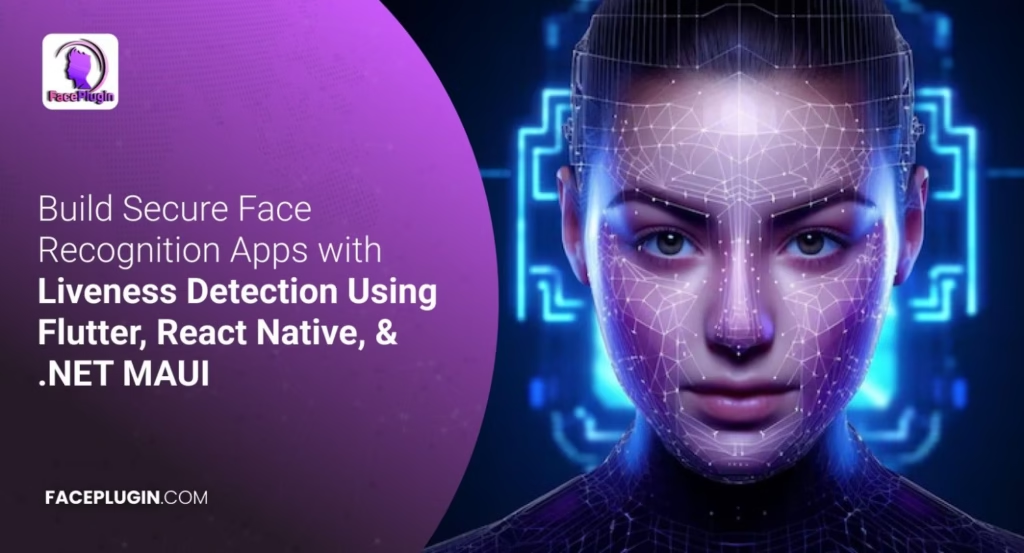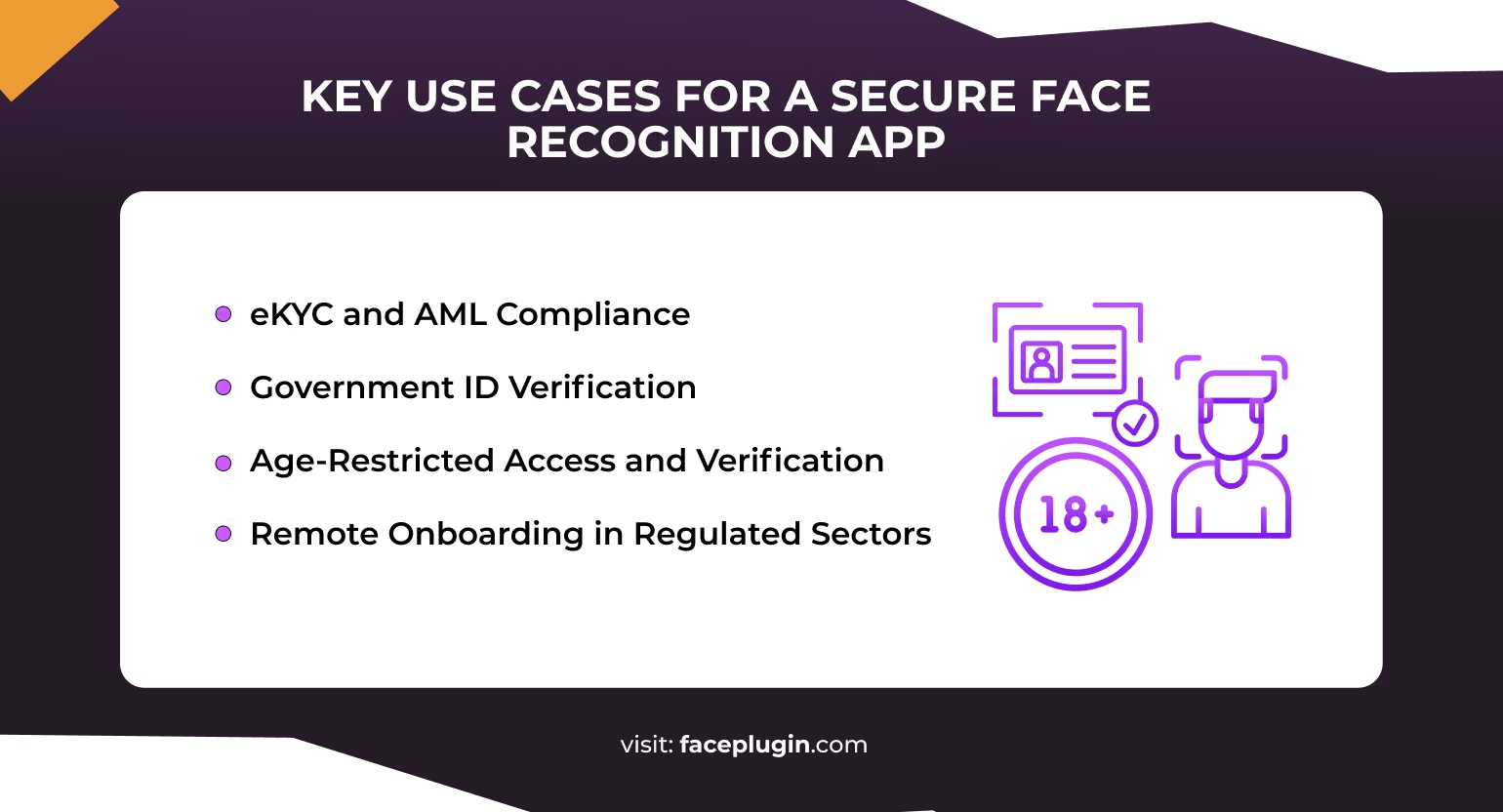Secure Face Recognition App development has become a cornerstone of modern biometric security, especially in sectors like fintech, healthcare, and identity verification. As cyber threats evolve and identity fraud surges, businesses are shifting toward AI-driven, on-device facial recognition that’s not only fast but also tamper-proof.
Users today expect seamless, frictionless logins yet behind the scenes, the system must be fortified against photos, masks, and deepfake attacks.
Enter FacePlugin, a trusted, enterprise-grade solution tailored for building next-gen Secure Face Recognition Apps. With support for Flutter, React Native, and .NET MAUI, FacePlugin offers full-stack SDKs with advanced features like 3D passive liveness detection, age/gender estimation, and micro-expression analysis all processed securely and offline on the user’s device.
This article is your guide to building cross-platform, privacy-compliant, and spoof-resistant facial authentication apps.
Whether you’re a developer aiming to integrate ISO 30107-3 Level 2 certified liveness detection, or a CTO seeking GDPR-compliant biometric infrastructure, this breakdown shows you how to leverage FacePlugin’s SDKs across diverse mobile ecosystems.
Read on to explore architecture designs, SDK integration strategies, and security best practices that make your Secure Face Recognition App not just functional but future-proof.
What Makes a Secure Face Recognition App Truly Secure?
Passive vs Active Liveness Detection
- A Secure Face Recognition App must detect real faces, not fakes.
- Active methods ask users to blink or turn slows down UX.
- Passive detection works silently no user action, seamless experience.
- FacePlugin uses 3D passive liveness with 78+ biometric cues.
- It detects texture, depth, light diffusion, and micro-expressions in real time.
- This method is invisible to users and highly resistant to spoofing.
Secure Face Recognition App Requires ISO/IEC 30107-3 Compliance
- Compliance proves anti-spoofing reliability under testing.
- FacePlugin’s SDK meets Level 1 & 2 of ISO 30107-3.
- It defends against photo, video, screen, and 3D mask attacks.
- Security auditors validate it through rigorous simulation benchmarks.
On-Premise vs Cloud – Where Processing Happens Matters
- Cloud-based systems face risks latency, privacy leaks, third-party exposure.
- FacePlugin offers on-premise deployment with offline support.
- It processes all facial data on the user’s device.
- This reduces attack surfaces and meets GDPR-compliance easily.
3D Anti-Spoofing Defines a Secure Face Recognition App
- Fake faces evolve security tech must evolve faster.
- FacePlugin’s 3D passive liveness is its core strength.
- It works across iOS, Android, React Native, and Flutter.
- Zero lag. Zero user action. Maximum fraud prevention.
Build a Secure Face Recognition App Using Flutter SDK
Why Flutter for a Secure Face Recognition App?
Building a Secure Face Recognition App with Flutter gives you power, speed, and flexibility. Flutter enables smooth cross-platform development using one codebase. The SDK integrates FacePlugin’s advanced biometric engine through native bridges Swift for iOS, Kotlin for Android. This allows full hardware acceleration and zero lag across devices.
The Flutter SDK architecture is tightly optimized for biometric performance. It combines a Dart plugin layer with a native communication bridge. Platform channels help the Dart side invoke native-level 3D face detection and liveness analysis without delay. That means your app stays fast and secure.
Performance: Multi-threaded and Real-Time
Face recognition tasks run in isolated threads using Dart Isolates. So, UI never blocks, even during heavy computation. Real-time 3D facial mapping completes in milliseconds. Users feel zero friction. Each Secure Face Recognition App must also handle complex tasks on-device. This SDK ensures that.
Security Features That Actually Matter
- All processing happens locally. No cloud dependency. No data ever leaves the device.
- Passive liveness detection runs silently using just one frame. The system reads the user’s face in a snap.
- FacePlugin uses over 78 biometric vector points for analysis depth cues, texture, micro-motions, and expressions.
- The app auto-rejects spoofs, deepfakes, 3D masks, or printed photos with ISO 30107-3 Level 1 & 2 accuracy.
This security architecture keeps identity fraud out. It also ensures regulatory compliance for fintech, healthcare, and public safety apps.
Integrating the Flutter SDK into Your Secure Face Recognition App
- The setup is fast and minimal. First, activate your FacePlugin license with _facesdkPlugin.setActivation(). That’s the only one-time configuration call.
- On Android, edit your manifest file to enable camera and face features. On iOS, modify the Info.plist to grant privacy permissions. This ensures camera access and smooth biometric processing.
- Then simply embed FacePlugin’s widget into your app’s UI flow. It’s already styled and logic-ready. You just plug and go.
- No heavy lifting. No custom rendering. Flutter handles the UI; FacePlugin handles the security.
Build Secure Face Recognition App Using React Native SDK
Developing a Secure Face Recognition App with React Native offers high-performance biometric protection across iOS and Android. React Native SDK by FacePlugin ensures military-grade face recognition and liveness detection. It helps tech teams deliver spoof-proof identity verification with minimal user friction and full platform coverage.
React Native SDK Architecture
React Native SDK blends cross-platform flexibility with native-level performance.
- It leverages TypeScript, Java, Kotlin, and Objective-C++ for seamless system-level integration.
- Native bridge wrappers let JavaScript interfaces interact with hardware-level biometric systems.
- Optimized SDK structure ensures high performance in real-time scenarios.
The architecture is ideal for developers looking to maintain app uniformity across platforms without compromising on detection depth or security response.
Security Layer Highlights in a Secure Face Recognition App
The SDK brings in advanced security for real-time biometric validation.
- ISO/IEC 30107-3 Level 2 liveness detection protects against high-grade spoofing.
- Offline functionality works well in fintech, law enforcement, and high-security zones.
- It detects face replay attacks, 2D prints, screens, and 3D masks effectively.
This SDK isn’t just about face detection; it enforces facial identity with advanced verification layers, creating a Secure Face Recognition App experience that’s both trusted and scalable.
Implementation Guide for React Native SDK
You can implement the FacePlugin React Native SDK in modular steps.
- Import the SDK into your React Native project.
- Activate licensing via secure keys in your environment files.
- Configure the face detection module via native bridge calls.
- Use event callbacks to handle states like success, failure, or spoof alerts.
Don’t forget to manage UI loading states and permissions this boosts UX clarity during camera access and detection prompts.
Why Choose FacePlugin for Your Secure Face Recognition App?
FacePlugin’s React Native SDK simplifies biometric integration for enterprise-grade apps. It:
- Offers device-side liveness detection with zero cloud dependency.
- Ensures GDPR and ISO compliance for global rollouts.
- Requires minimal effort to scale security layers for apps with sensitive user data.
It’s the go-to SDK if you want your Secure Face Recognition App to meet enterprise standards, perform under pressure, and deliver smooth user experiences.
Build a Secure Face Recognition App with .NET MAUI
Developing a Secure Face Recognition App using .NET MAUI gives you platform-wide flexibility and enterprise-grade biometric performance. This stack lets you write once, deploy everywhere on Android, iOS, macOS, and Windows with deep hardware-level integration. If you’re already familiar with .NET, C#, or cross-platform builds, this is your lane.
Why Use .NET MAUI for Secure Face Recognition Apps?
.NET MAUI enables multi-platform biometric deployment from a single codebase.
- Share UI, logic, and services across iOS, Android, macOS, and Windows.
- It directly taps into native camera APIs, avoiding lag or low-level conflicts.
- Works beautifully with biometric libraries built in C++ or C# hybrid layers.
You don’t fight the platform you leverage it fully for a powerful, Secure Face Recognition App framework.
Key Advantages of FacePlugin’s MAUI SDK
FacePlugin’s SDK for .NET MAUI is purpose-built for secure identity use cases.
- Deploys fully on-premise no cloud round-trips, no latency, no data leaks.
- Supports real-time face matching, spoof detection, and passive liveness in a tightly integrated C#/C++ pipeline.
- Meets ISO 30107-3 Level 2 and GDPR standards, making it suitable for compliance-heavy sectors.
Its high-speed engine makes face detection fast, reliable, and practically unbreakable against known spoofing vectors like replays or masks.
Build the Future with a Secure Face Recognition App
.NET MAUI with FacePlugin gives developers complete control over data, speed, and accuracy.
- You keep your face data local great for banking, defense, and privacy-first markets.
- There’s no bloated dependency just lean, native code doing the job.
This is your toolkit for building a Secure Face Recognition App that actually earns trust, not just claims it.
Key Use Cases for a Secure Face Recognition App
A Secure Face Recognition App isn’t just about login screens it’s powering identity ecosystems across regulated industries. Built right, it handles sensitive data, ensures legal compliance, and prevents spoofing. Let’s explore where it matters most.
eKYC and AML Compliance
- Verify user identities instantly during onboarding.
- Cross-check IDs with facial biometrics for regulatory assurance.
- Reduce fraud risk while meeting FATF, or EU standards.
Government ID Verification
- Validate passport, national ID, or residency documents.
- Extract data using MRZ, OCR, and NFC technologies.
- Confirm identity using passive 3D facial liveness detection.
Age-Restricted Access and Verification
- Enable automatic age validation in alcohol, gaming, or dating platforms.
- Avoid human review with real-time, on-device checks.
- Improve user flow while staying fully compliant.
Remote Onboarding in Regulated Sectors
- Deploy across fintech, healthcare, telecom, and government workflows.
- Let users onboard anytime, anywhere, with high assurance.
- Process secure verifications without storing sensitive face data in the cloud.
Why FacePlugin?
FacePlugin’s SDK is GDPR and ISO 30107-3 Level 2 compliant.
- Keeps all data local with on-premise deployment.
- Passively detects deepfakes, replays, and spoof attempts.
- Perfect for building a scalable, Secure Face Recognition App.
Frequently Asked Questions About Secure Face Recognition App
Developers and businesses deploying a Secure Face Recognition App often face recurring questions about implementation, performance, and spoof-resistance. Below are some essential answers to common concerns especially relevant for fintech, healthtech, and identity platforms seeking compliant biometric solutions.
What is the most secure method for facial recognition?
The most secure method currently available is 3D passive liveness detection. Unlike active methods that require blinking or head movements, passive detection analyzes depth cues, micro-expressions, and over 70 facial landmarks in real time.
FacePlugin leads in this space, using a military-grade algorithm that inspects facial textures, skin reflectance, and subtle biological signals without asking the user to move. This approach ensures that the Secure Face Recognition App remains non-intrusive and frictionless while resisting even sophisticated spoofing like deepfakes and silicone masks.
Can a Secure Face Recognition App work offline?
Absolutely yes. Offline capability is a key strength of FacePlugin’s architecture. Its SDKs support fully on-premise deployment, ensuring all biometric verification processes happen directly on the user’s device whether Android, iOS, or desktop.
There’s zero reliance on cloud computing for authentication, which greatly enhances privacy and security. That also reduces latency, ensures GDPR compliance, and allows organizations to operate in low-connectivity or regulated environments without compromising functionality.
How does liveness detection prevent spoofing?
Liveness detection is a critical part of any Secure Face Recognition App. It identifies whether the input face has real biological characteristics by evaluating elements like skin elasticity, natural eye movements, and light diffusion.
Passive systems analyze micro-level cues instantly. If the system detects flat surfaces, printed photos, replayed videos, or even high-end 3D masks, it blocks access. The result? Fraudsters fail, legitimate users pass no interruptions or manual checks needed.
Is integration possible across platforms with one codebase?
Yes, that’s not only possible it’s the new standard. FacePlugin provides SDKs for Flutter and .NET MAUI, which let developers build once and deploy across Android, iOS, and Windows/macOS desktop. The shared codebase dramatically reduces dev time, testing effort, and release cycles.
You build your Secure Face Recognition App faster and more consistently, without sacrificing biometric performance or compliance. Developers can also integrate FacePlugin’s liveness APIs and facial recognition modules directly within their existing CI/CD pipelines for seamless automation.
Conclusion – Why FacePlugin Is the Smarter Choice for a Secure Face Recognition App
When developing a Secure Face Recognition App, precision, speed, and compliance are non-negotiables. FacePlugin brings all three backed by 99.8% biometric accuracy and ISO 30107-3 Level 2 certification.
Its advanced 3D passive liveness detection guards against spoofing attacks like printed images, video replays, and silicone masks. The app reads facial depth, texture, and involuntary micro-expressions without requiring user interaction, making it seamless and invisible to end users.
FacePlugin supports multiple platforms, including Flutter, React Native, and .NET MAUI. Developers can write once and deploy to Android, iOS, and desktop, with no drop in performance. That’s especially valuable for cross-platform enterprise apps that demand high security, low latency, and consistent user experience.
The SDKs are designed for real-time, on-device verification, ensuring data never leaves the user’s device perfect for GDPR and HIPAA compliance.
Whether you’re building for banking, telemedicine, or digital identity, a Secure Face Recognition App built on FacePlugin scales easily and performs reliably. You can get started by downloading SDKs for your preferred framework.
Activation keys, technical documentation, and dedicated developer support are readily available. For volume licensing or custom deployment options, FacePlugin offers personalized consultation. Make your next app secure, fast, and future-ready with FacePlugin.
Elevate Your Identity Security: Advanced Biometric Solutions at FacePlugin
Transform the way you secure and verify identities with FacePlugin, the leading provider of cutting-edge biometric authentication and ID verification solutions. Our platform is designed to meet the highest standards of security and efficiency, offering seamless integration for businesses across various industries.
At FacePlugin, we understand the importance of protecting your digital assets. That’s why we provide robust solutions, including advanced face recognition, face liveness detection (anti-spoofing), and ID document recognition technologies. Our solutions are engineered to ensure that identity verification is not only secure but also user-friendly and accessible.
Explore our range of customizable solutions, available both online and through our mobile SDKs. Whether you require on-premises or cloud-based deployment, FacePlugin has you covered with flexible options tailored to your specific needs. If you want to learn more about us, you can explore our articles on our website.
Experience the future of identity security today with FacePlugin—where innovation meets reliability. Start your journey towards enhanced security and peace of mind by visiting our website or trying our solutions online.
📍 FacePlugin – Contact & Integration Support
Head Office Address
📍 701 N. Fort Lauderdale Beach Blvd, Fort Lauderdale, FL 33304
📞 Phone: +1 (442) 229-5661
📧 Email: info@faceplugin.com
📱 Telegram: https://t.me/faceplugin
Get quotes and technical support from the expert team for smooth onboarding.P,





